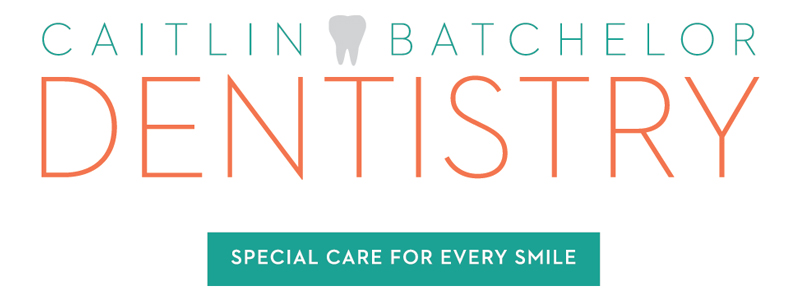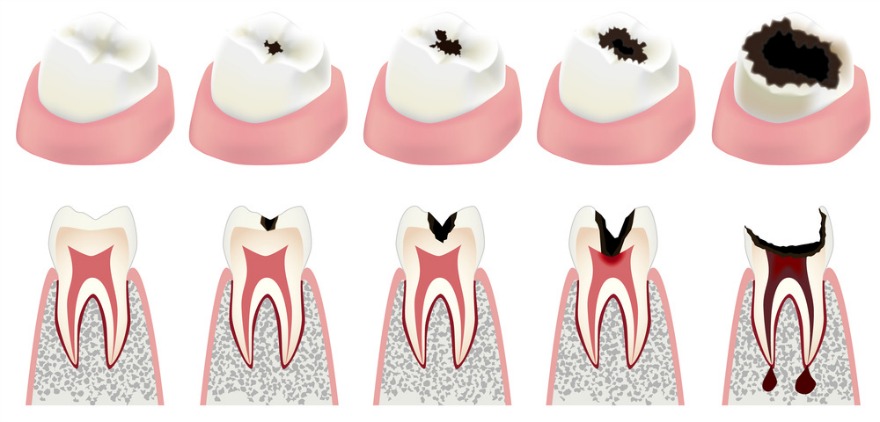What Causes Cavities?
In our office, we get a lot of questions about cavities, especially in adults. Cavities can occur at any age, and to understand why, let’s look at the big picture. Then we’ll explore what increases your cavity risk and end with some quick tips and tricks to avoid cavities.
Where Do Cavities Come From?
Food combined with bacteria found naturally in the mouth can cause tooth decay, also known as cavities or caries. Plaque, a whitish, sticky substance made of food, bacteria, and their waste, accumulates on teeth and gums. The bacteria in plaque feeds on the sugars in the food you eat.
As the bacteria feed, they produce acid waste products that are damaging to teeth. Every time you eat, acids reach dangerous levels for about 20 minutes after your meal or snack. Over time, these acids leach minerals out of tooth enamel, causing destruction of tooth structure and cavities.
What Increases My Risk for Cavities?
1. Eating foods that are high in sugar and other carbohydrates.
Sugary foods (e.g., soda, candies, ice cream) and foods containing carbohydrates (e.g., bread, rice, cereals) break down into fermentable carbohydrates in your mouth -- essentially becoming “bacteria food”!
The waste product of bacteria is highly acidic, which in turn breaks down tooth enamel, leading to “holes” or cavities in teeth. Left untreated, these cavities can spread to the tooth pulp and nerve, leading to dental abscesses, infection, and a host of other problems.
2. Failing to brush and floss your teeth regularly and not seeing a dentist for checkups and cleanings.
Photo: Ken Whytock
Brushing your teeth throughout the day removes plaque deposits that form on the surface of your teeth. To avoid cavities, we recommend brushing after each meal, with the brushing before bedtime being the most important.
Flossing at least once every day is also necessary to remove these deposits from between the teeth, where the toothbrush bristles cannot fully reach. Scheduling a biannual check-up with us will ensure that your hygiene is up to the task of keeping decay from starting!
3. Fluoride deficiency.
Fluoride helps prevent tooth decay by actually strengthening teeth, making them more resistant to acids produced by plaque. We recommend at least three fluoride exposures per day to lower your cavity risk. Fluoride is added to most public water supplies and is in most toothpastes on the market today. If your water is from a well, you may not be getting enough fluoride to prevent cavities, so please consider discussing additional fluoride options with us.
4. Lacking sufficient saliva.
Saliva washes away food, harmful sugars, and plaque. It also helps the mouth battle high acid levels and return to a neutral environment after eating. Dry mouth, or xerostomia, is a normal part of aging, as salivary glands become less productive over time.
However, it is also a common side effect of more than 500 medications, including those commonly prescribed for allergies or asthma, high blood pressure, high cholesterol, pain, anxiety or depression, Parkinson’s, and Alzheimer’s diseases. That’s just one reason why it’s so important to tell your dentist about any medications that you’re taking. There are a few products we can recommend to combat the effects of xerostomia, and drinking plenty of water to quench a dry mouth is a simple, effective place to start.
5. High levels of cavity-causing bacteria.
You’re born with almost no bacteria in your mouth, so how do you get it? During your childhood, your mother, family members, and caregivers pass on oral bacteria that lead to cavities. These bacteria are transmitted through simple acts like kissing, tasting food, or blowing on food to cool it down before giving it to baby.
Photo: Larisa Okhtienko
Research has shown that a naturally-derived sweetener called xylitol can reduce the number of new cavities by inhibiting the attachment and growth of infection and decay- causing bacteria by as much as 90% when used regularly. Xylitol is safe for adults, children, and pregnant women and can play a significant role in fending off both cavities and a dry mouth. Xylitol is an ingredient in a variety of oral care products that can be found at natural food stores.
Other factors that may increase your likelihood of developing cavities include:
Frequent acid attacks from acid reflux or gastric problems
Eating disorders (i.e., bulimia)
Exposed root surfaces (particularly vulnerable to cavities as we age)
Family history of decay (parents who have had a lot of cavities pass these bacteria on to children at birth and throughout childhood)
It’s important to be aware of your family and personal medical history as well as any habits that could be affecting your oral health.
How Can I Lower My Cavity Risk?
It’s easy to see that there are a multitude of threats against your teeth! When left unhindered, your teeth are at a very high risk for developing cavities, thanks to high starch and sugar intake, plaque buildup, poor brushing habits, high bacteria and acid levels, infrequent fluoride exposures, and a dry mouth.
But you can fight off cavities with a few easy steps! Here’s how:
Watch your sugar and carb intake, and brush your teeth after eating these foods especially.
Brush your teeth after each meal, or at least before bedtime.
Floss regularly (daily is best).
See your dentist for cleanings and checkups every six months.
Use a toothpaste with fluoride.
Tell your dentist if you have dry mouth or are taking any new medications.
Drink plenty of water.
We hope you will take time to implement some of our recommendations, and pass on this information to your family members so they can prevent cavities too.
If you have any questions or comments, we’d love to hear from you!




